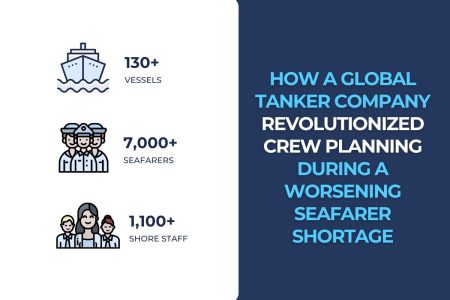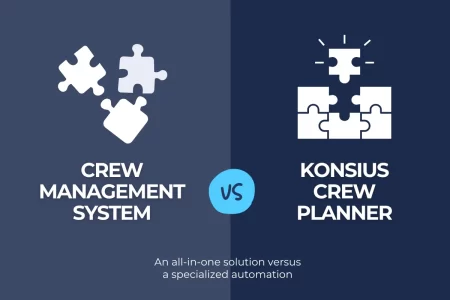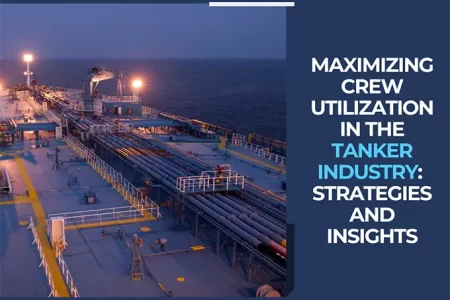Improving Seafarer Welfare Through Advanced Crew Planning
The maritime profession is both commendable and uniquely challenging. Seafarers face significant stress and uncertainty due to the demanding and often unpredictable nature of life at sea. Traditional crew planning methods can intensify these issues, impacting both job performance and personal well-being. To truly improve the welfare of seafarers, crew planning needs to adopt a welfare-first approach that addresses these longstanding challenges in the industry.
Current Methods and their Consequences
Unpredictable Schedules Causing Stress and Uncertainty
One of the biggest sources of stress for seafarers is the inconsistency in schedules. When crew members cannot rely on a stable routine, it disrupts their ability to make personal plans and maintain a sense of normalcy. The anxiety that comes from not knowing when they’ll be able to connect with loved ones or what their future assignments look like can heavily affect their mental and emotional well-being.
Last-Minute Changes to Assignments
Unexpected, last-minute changes in assignments are common but problematic. Such changes force seafarers to adjust their personal plans with little notice, creating immense frustration and uncertainty. This constant disruption can decrease morale, diminish job satisfaction, and add to an already stressful environment.
Lack of Long-Term Planning
Crew planning in its traditional form often fails to look beyond immediate needs, addressing short-term problems without considering the bigger picture. Without robust long-term strategies, the risk of unexpected disruptions increases, placing additional strain on both the crew and operations. A well-thought-out, forward-thinking approach is necessary to provide stability and prepare for potential issues before they become crises.
Limited Career Development Opportunities
Traditional planning rarely considers the long-term professional growth of seafarers. Many crew members struggle to understand or achieve the requirements for career progression. Without clear visibility into future opportunities or the training they need, seafarers can feel stagnant and unfulfilled in their roles. This lack of professional growth can negatively affect motivation and long-term career satisfaction.
Extended Periods Away from Home Affecting Welfare
Long periods away from home take a significant toll on the physical and emotional health of seafarers. Extended contracts or unexpected onboard extensions strain relationships, lead to burnout, and make work-life balance feel unattainable. The pressure of being far from loved ones and missing important family moments adds to the emotional weight seafarers carry.
How Advanced Crew Planning Can Foster Welfare
The Konsius Crew Planner includes features designed to enhance crew scheduling and management in the maritime industry. Here’s an overview of what it offers:

Creating Fair and Predictable Schedules
One of the most impactful ways to improve welfare is through fair and transparent scheduling. When seafarers have a clear understanding of their work and rest periods, they can better plan their personal lives, reduce stress, and enjoy a more balanced lifestyle. Predictable schedules allow seafarers to feel more in control and improve their overall mental health.
Reducing Last-Minute Disruptions
Reliable scheduling practices can minimize the frustration and stress caused by unexpected changes. By ensuring that assignments are planned with a high degree of reliability, seafarers can make personal commitments without the constant fear of having to cancel or rearrange them. Stability and predictability lead to higher job satisfaction and a healthier work environment.
Long-Term Planning
With firm and long-term plans for all vessels and seafarers, there is greater predictability and transparency. This allows seafarers to better plan their personal lives well in advance and maintain a healthier work-life balance. Another benefit is the fair distribution of work during holidays and important events, ensuring that the same crew members are not always working during these significant family occasions.
Supporting Career Development
Advanced planning can also help seafarers grow professionally. By mapping out training requirements and career pathways, seafarers can gain the skills and qualifications they need for advancement. Continuous professional development not only benefits the seafarers themselves but also enhances the skills and efficiency of the entire crew.
Considering Personal and Family Well-being
A key aspect of welfare-focused planning is acknowledging and respecting crew members’ personal and family needs. Thoughtful scheduling that includes consideration for important holidays or events, and efforts to reduce the time spent away from home, can significantly improve the quality of life for seafarers. A focus on welfare ensures that seafarers are not just seen as workers but as individuals with lives and families that matter.
Final Thoughts
The well-being of seafarers is crucial to the success of maritime operations. By rethinking crew planning with a welfare-first approach, the industry can create a safer, more supportive environment that promotes physical, mental, and emotional health. A healthier crew leads to more effective operations, higher morale, and a stronger maritime community overall.
Improving the lives of those at sea starts with understanding their challenges and planning better. Seafarer welfare isn’t just about safety or efficiency; it’s about humanity, respect, and ensuring that those who keep global trade moving feel valued and supported.
If you see value in what we’ve shared and feel that our approach could benefit your operations, we’d be happy to have a conversation. Feel free to reach out for a free consultation to explore if our solution is right for your needs.



